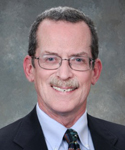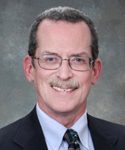What initially strikes people about Christopher Adams, MD, FACP, FACR, is his passion for fairness. In 2015, he told readers of The Rheumatologist, “Patients often feel powerless to fight the system and advocate for themselves, and many of my patients felt they lacked a mechanism for addressing their concerns. That’s where we come in.”
Dr. Adams is dedicated to leveling the playing field for patients. He says, “Rheumatologists are advocates for arthritis patients because we see firsthand the medical, psychological and social destructiveness of the illnesses we treat.”
As the incoming chair of the ACR’s Affiliate Society Council, Dr. Adams is now in a position to help even more patients. He plans to help state societies develop tools to encourage legislators and insurance companies to enact legislation and policies that empower rheumatologists and other healthcare professionals to better care for their patients.
Many Sides of Medicine
Throughout his career, Dr. Adams has experienced many different sides of medicine, which encouraged him to embrace a patient advocacy role. Between 1977 and 1991, he served in the U.S. Air Force and then the Army Reserves, graduating medical school in 1981 from the University of Alabama-Birmingham (UAB). He completed his residency and internship in 1984 at Wilford Hall USAF Medical Center at Lackland Air Force Base in San Antonio, Texas. As a military officer and a physician specializing in internal medicine, he wore many hats—overseeing an emergency department and immunizations clinic, serving as volunteer clinical faculty at the University of California-Davis in the 1980s and the University of Arkansas for Medical Sciences in the 1990s. Then he moved on to small specialty and large multispecialty group practices.
Currently, he is the chief of rheumatology at the East Alabama Rheumatology Center, which is part of the East Alabama Medical Center in Auburn-Opelika, Ala., and also a guest lecturer and clinical professor at the Edward Via College of Osteopathic Medicine in Auburn, Ala. Over the past decade, he has also served as the governmental affairs and managed care liaison for the Alabama Society for Rheumatic Diseases (ASRD).
“What compels me to get involved in advocacy is making sure that patients get a fair shake,” says Dr. Adams, adding that he wants to help state medical societies address targeted health issues, such as the high cost of biologic drugs. “What’s happening in the world of healthcare is so lopsided. Patients don’t have the background to fully understand what some of the healthcare delivery policies are doing to them.”
A Man of Action
As a patient advocate, Dr. Adams has made some recent headway. Several years ago, he helped thwart the leading insurance company in Alabama from denying coverage for viscosupplementation (i.e., hyaluronic acid treatment) for arthritis patients. This year, he helped prevent the passage of a biosimilars substitution bill that he and his colleagues in the ASRD felt did not ensure adequate provider notification needed to safeguard patients.
In his upcoming role as chair, Dr. Adams plans to help empower state and local rheumatology societies through the work of the ACR’s Affiliate Society Council. One facet of this work is his plan to assist societies in developing academic and pragmatic business arguments to sway insurance companies from enacting policies that mainly boost profit margins instead of enhancing patient care.
Like all businesses, insurance companies must be profitable. However, Dr. Adams says withholding coverage for expensive drugs that make a difference in patient outcomes is “immoral.”
He continues, “My sense of fairness and dedication to patient health and well-being compels me to [do] something about this.”
Key Issues for State Advocacy
Several issues are on the current Affiliate Society Council agenda, including:
- Non-medical switching;
- Biosimilar substitution;
- Prior authorization;
- Pharmacy benefit manager practices;
- Specialty tiers; and
- Step therapy protocols.
Dr. Adams says, “It’s really easy to sit around and bellyache about things. At the end of the day, what really counts is what we can do to modify a system that we don’t like so it works better.”
Carol Patton is a freelance writer based in Las Vegas.

